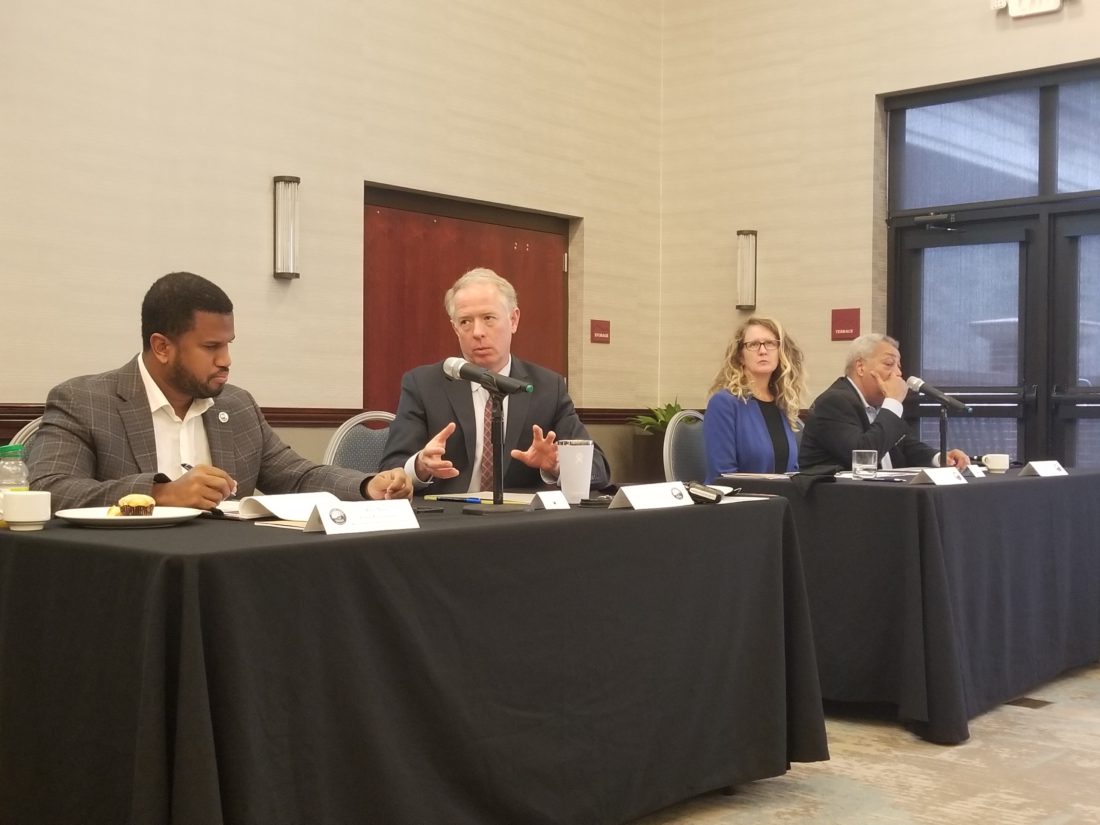Legislating change at the N.C. General Assembly, says Trafton Dinwiddie, is all about “the art of the possible.” During a Jan. 30 special meeting of the Buncombe County Board of Commissioners, he and fellow Ward and Smith lobbyist Whitney Campbell Christensen spent some time painting what the county might feasibly hope to accomplish in Raleigh this year.
Buncombe first hired Ward and Smith last May, agreeing to pay the firm $72,000 annually to advocate for the county’s interests at the state legislature. The Jan. 30 gathering at the DoubleTree hotel in Biltmore Village marked the first extended public discussion of the lobbyists’ work since that contract was inked.
The legislative agenda the county seeks to pursue in 2023 can be divided into appropriations requests and policy changes. Topping the first category, said Christensen, was extra funding for state employees, particularly those working in K-12 and community college education.
Although education groups, both at the state level and in Buncombe, have long pushed for higher salaries for teachers and support staff, Christensen said the “novelty of a county coming out with this as a top goal” could help push lawmakers to include those raises in the state budget.
Other priorities included money to improve water quality in the French Broad River, support for the Innovations Waiver program (which provides community-based care for people with intellectual or developmental disabilities) and funding for McCormick Field. Regarding the last item, Christensen said lobbyists with Major League Baseball had been advocating at the General Assembly over the past year to promote a state-funded grant program for minor league facilities throughout North Carolina.
“[Former Republican state Sen. Chuck] Edwards worked really hard on this last session and really had that funding within a hair of being included in the budget,” Christensen said about the baseball grants. “In fact, leading up to budget day, I think we all were pretty confident it was going to be in there. So, we have reason to believe that we’ll have appropriations support.”
On the policy side of the agenda, Buncombe will continue to fight against any legislation that would limit its power to make rules around short-term rentals such as Airbnbs. Although STRs are now allowed nearly anywhere in unincorporated areas of the county, and Board of Commissioners Chair Brownie Newman said commissioners have no intent “to ban or get rid of” the practice, the board wants to retain authority for future regulatory changes.
Christensen said Buncombe’s lobbyists were in regular contact with those working for the STR industry; she added that “the county was complimented for how reasonable it was” in backroom talks about the issue last year. She said those industry lobbyists plan to work toward limiting local government power again this session.
Buncombe will ask state leaders “to evaluate methods to modernize N.C. House Occupancy Tax guidelines to meet the evolving visitation and infrastructure needs of Buncombe County.” Last year, the General Assembly shifted how the Buncombe County Tourism Development Authority must manage those tax proceeds: A third must now be used for tourism capital projects and maintenance, up from 25%, with the remainder used for advertising.
Speaking with Xpress after the meeting, Christensen counted that change as Ward and Smith’s biggest achievement last year, saying that lobbyists had to overcome unexpected resistance from House Republicans. But because the new tax arrangement is at the limits of what House guidelines authorize, she continued, shifting more money away from advertising will require a longer-term approach.
The county will also request that the state study ways to give permanent North Carolina residents property tax relief. Although Buncombe has explored ideas like differential tax rates for primary and secondary residences, Newman explained, many proposals currently face legal obstacles. “It’s such a complex issue, we didn’t feel like endorsing a particular solution at this point was the right way to go,” he said.
Despite the substantial docket, Dinwiddie said, the legislative agenda represented only half of what Ward and Smith would do in the coming year. “The other 50% is playing defense against things we don’t know about — and definitely can’t support,” he said.
The full legislative agenda is available online at avl.mx/cdg.




Before you comment
The comments section is here to provide a platform for civil dialogue on the issues we face together as a local community. Xpress is committed to offering this platform for all voices, but when the tone of the discussion gets nasty or strays off topic, we believe many people choose not to participate. Xpress editors are determined to moderate comments to ensure a constructive interchange is maintained. All comments judged not to be in keeping with the spirit of civil discourse will be removed and repeat violators will be banned. See here for our terms of service. Thank you for being part of this effort to promote respectful discussion.